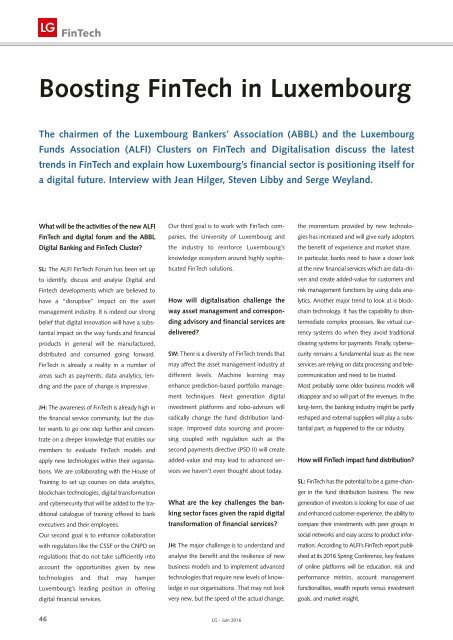You also want an ePaper? Increase the reach of your titles
YUMPU automatically turns print PDFs into web optimized ePapers that Google loves.
FinTech<br />
Boosting FinTech in Luxembourg<br />
The chairmen of the Luxembourg Bankers’ Association (ABBL) and the Luxembourg<br />
Funds Association (ALFI) Clusters on FinTech and Digitalisation discuss the latest<br />
trends in FinTech and explain how Luxembourg’s financial sector is positioning itself for<br />
adigital future. Interview with Jean Hilger, Steven Libby and Serge Weyland.<br />
What will be the activities of the new ALFI<br />
FinTech and digital forum and the ABBL<br />
Digital Banking and FinTech Cluster?<br />
SL: The ALFI FinTech Forum has been set up<br />
to identify, discuss and analyse Digital and<br />
Fintech developments which are believed to<br />
have a “disruptive” impact on the asset<br />
management industry. It is indeed our strong<br />
belief that digital innovation will have a substantial<br />
impact on the way funds and financial<br />
products in general will be manufactured,<br />
distributed and consumed going forward.<br />
FinTech is already a reality in a number of<br />
areas such as payments, data analytics, lending<br />
and the pace of change is impressive.<br />
JH: The awareness of FinTech is already high in<br />
the financial service community, but the cluster<br />
wants to go one step further and concentrate<br />
on a deeper knowledge that enables our<br />
members to evaluate FinTech models and<br />
apply new technologies within their organisations.<br />
We are collaborating with the House of<br />
Training to set up courses on data analytics,<br />
blockchain technologies, digital transformation<br />
and cybersecurity that will be added to the traditional<br />
catalogue of training offered to bank<br />
executives and their employees.<br />
Our second goal is to enhance collaboration<br />
with regulators like the CSSF or the CNPD on<br />
regulations that do not take sufficiently into<br />
account the opportunities given by new<br />
technologies and that may hamper<br />
Luxembourg’s leading position in offering<br />
digital financial services.<br />
Our third goal is to work with FinTech companies,<br />
the University of Luxembourg and<br />
the industry to reinforce Luxembourg’s<br />
knowledge ecosystem around highly sophisticated<br />
FinTech solutions.<br />
How will digitalisation challenge the<br />
way asset management and corresponding<br />
advisory and financial services are<br />
delivered?<br />
SW: There is a diversity of FinTech trends that<br />
may affect the asset management industry at<br />
different levels. Machine learning may<br />
enhance prediction-based portfolio management<br />
techniques. Next generation digital<br />
investment platforms and robo-advisors will<br />
radically change the fund distribution landscape.<br />
Improved data sourcing and processing<br />
coupled with regulation such as the<br />
second payments directive (PSD II) will create<br />
added-value and may lead to advanced services<br />
we haven’t even thought about today.<br />
What are the key challenges the banking<br />
sector faces given the rapid digital<br />
transformation of financial services?<br />
JH: The major challenge is to understand and<br />
analyse the benefit and the resilience of new<br />
business models and to implement advanced<br />
technologies that require new levels of knowledge<br />
in our organisations. That may not look<br />
very new,but the speed of the actual change,<br />
the momentum provided by new technologies<br />
has increased and will give early adopters<br />
the benefit of experience and market share.<br />
In particular, banks need to have a closer look<br />
at the new financial services which are data-driven<br />
and create added-value for customers and<br />
risk management functions by using data analytics.<br />
Another major trend to look at is blockchain<br />
technology. It has the capability to disintermediate<br />
complex processes, like virtual currency<br />
systems do when they avoid traditional<br />
clearing systems for payments. Finally,cybersecurity<br />
remains a fundamental issue as the new<br />
services arerelying on data processing and telecommunication<br />
and need to be trusted.<br />
Most probably some older business models will<br />
disappear and so will partof the revenues. In the<br />
long-term, the banking industry might be partly<br />
reshaped and external suppliers will play a substantial<br />
part, as happened to the car industry.<br />
How will FinTech impact fund distribution?<br />
SL: FinTech has the potential to be a game-changer<br />
in the fund distribution business. The new<br />
generation of investors is looking for ease of use<br />
and enhanced customer experience, the ability to<br />
compare their investments with peer groups in<br />
social networks and easy access to product information.<br />
According to ALFI’s FinTech report published<br />
at its 2016 Spring Conference, key features<br />
of online platforms will be education, risk and<br />
performance metrics, account management<br />
functionalities, wealth reports versus investment<br />
goals, and market insight.<br />
46<br />
<strong>LG</strong> - Juin 2016


















